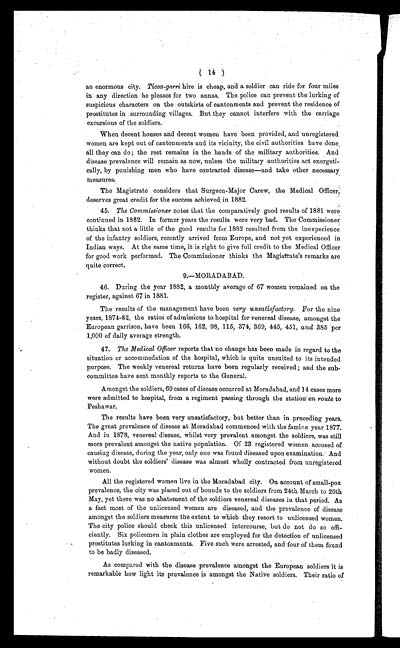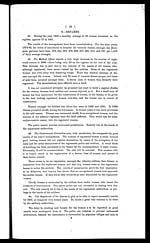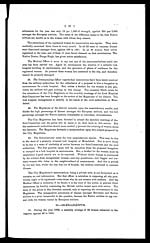Medicine - Institutions > Lock hospitals > Annual report on the working of the lock hospitals in the North-Western Provinces and Oudh > 1882
(324) Page 14
Download files
Individual page:
Thumbnail gallery: Grid view | List view

( 4 )
an enormous city. Ticca-garri hire is cheap, and a soldier can ride for four miles
in any direction he pleases for two annas. The police can prevent the-lurking of
suspicious characters on the outskirts of cantonments and prevent the residence of
prostitutes in surrounding villages. But they cannot interfere with the carriage
excursions of the soldiers.
When decent houses and decent women have been provided, and unregistered,
women are kept out of cantonments and its vicinity, the civil authorities have done,
all they can do ; the rest remains in the hands of the military authorities. And
disease prevalence will remain as now, unless the military authorities act energeti-
cally, by punishing men who have contracted disease—and take other necessary
measures.
The Magistrate considers that Surgeon-Major Carew, the Medical Officer;
deserves great credit for the success achieved in 1882.
45. The Commissioner notes that the comparatively good results of 1881 were
continued in 1882. In former years the results were very bad. The Commissioner
thinks that not a little of the good results for 1882 resulted from the inexperience
of the infantry soldiers, recently arrived from Europe, and not yet experienced in
Indian ways. At the same time, it is right to give full credit to the Medical Officer
for good work performed. The Commissioner thinks the Magistrate's remarks are
quite correct.
9.—MORADABAD.
46. During the year 1882, a monthly average of 67 women remained on the
register, against 67 in 1881.
The results of the management have been very unsatisfactory. For the nine
years, 1874-82, the ratios of admissions to hospital for venereal disease, amongst the
European garrison, have been 166, 162, 98, 115, 374, 369, 445, 451, and 385 per
1,000 of daily average strength.
47. The Medical Officer reports that no change has been made in regard to the
situation or accommodation of the hospital, which is quite unsuited to its intended
purpose. The weekly venereal returns have been regularly received ; and the sub-
committee have sent monthly reports to the General.
Amongst the soldiers, 69 cases of disease occurred at Moradabad, and 14 cases more
were admitted to hospital, from a regiment passing through the station en route to
Peshawar.
The results have been very unsatisfactory, but better than in preceding years.
The great prevalence of disease at Moradabad commenced with the famine year 1877.
And in 1878, venereal disease, whilst very prevalent amongst the soldiers, was still
more prevalent amongst the native population. Of 23 registered women accused of
causing disease, during the year, only one was found diseased upon examination. And
without doubt the soldiers' disease was almost wholly contracted from unregistered
women.
All the registered women live in the Moradabad city. On account of small-pox
prevalence, the city was placed out of bounds to the soldiers from 24th March to 20th
May, yet there was no abatement of the soldiers venereal diseases in that period. As
a fact most of the unlicensed women are diseased, and the prevalence of disease
amongst the soldiers measures the extent to which they resort to unlicensed women.
The city police should check this unlicensed intercourse, but do not do so effi-
ciently. Six policemen in plain clothes are employed for the detection of unlicensed
prostitutes lurking in cantonments. Five such were arrested, and four of them found
to be badly diseased.
As compared with the disease prevalence amongst the European soldiers it is
remarkable how light its prevalence is amongst the Native soldiers. Their ratio of
Set display mode to: Large image | Zoom image | Transcription
Images and transcriptions on this page, including medium image downloads, may be used under the Creative Commons Attribution 4.0 International Licence unless otherwise stated. ![]()
| India Papers > Medicine - Institutions > Lock hospitals > Annual report on the working of the lock hospitals in the North-Western Provinces and Oudh > 1882 > (324) Page 14 |
|---|
| Permanent URL | https://digital.nls.uk/75111843 |
|---|




